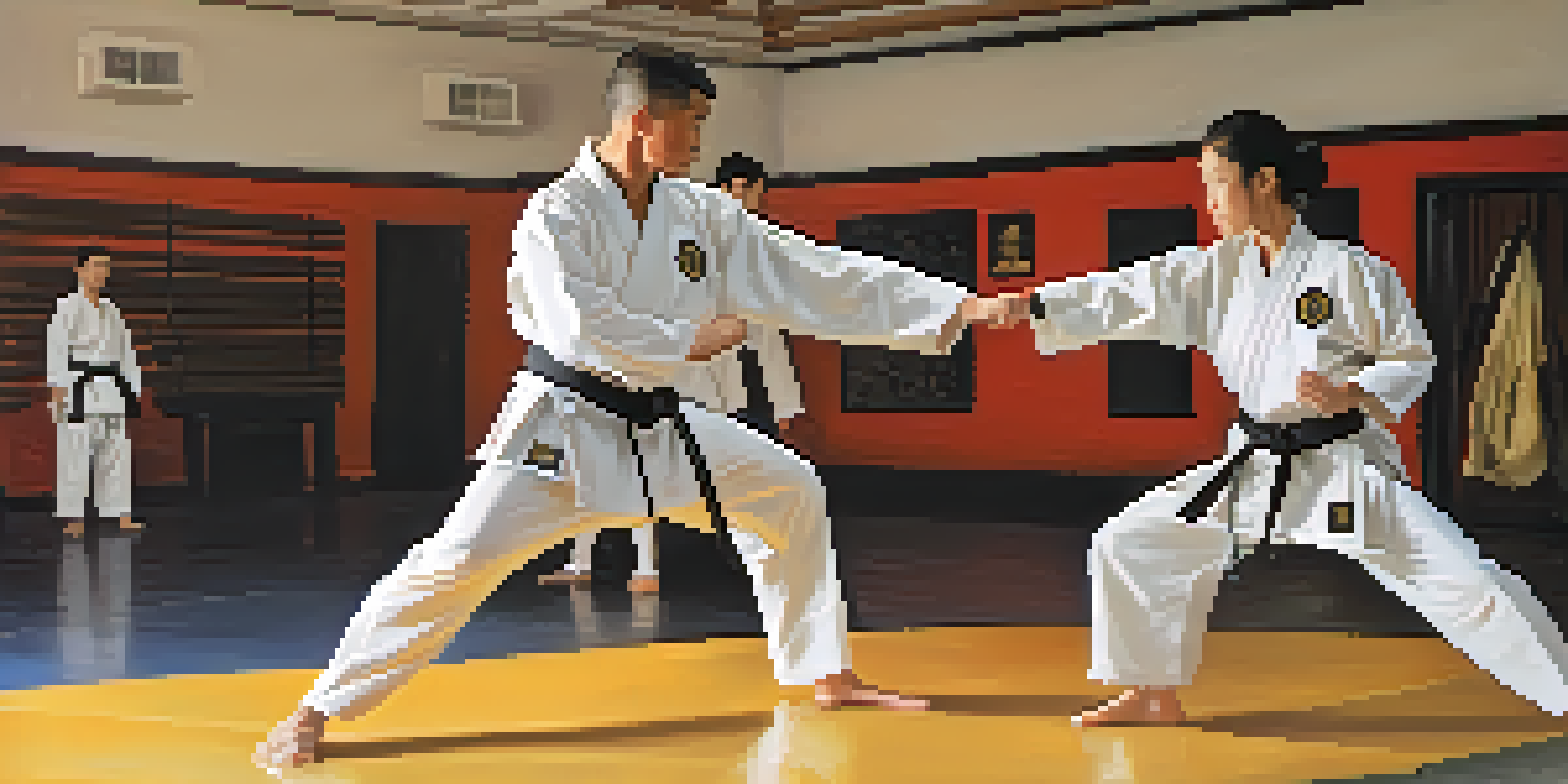Mindfulness and Reflexes: A Self Defense Connection

Understanding Mindfulness and Its Benefits
Mindfulness is the practice of being fully present and engaged in the moment. It involves observing your thoughts and feelings without judgment, which can lead to greater emotional regulation and clarity. In our fast-paced world, cultivating mindfulness can help reduce stress and enhance overall well-being, making it an invaluable skill for anyone.
Mindfulness isn't difficult, we just need to remember to do it.
When we practice mindfulness, we train our brains to respond rather than react impulsively. This means instead of letting fear or anxiety dictate our actions in a self-defense situation, we can maintain a clear mind. This clarity allows for better decision-making and can improve our ability to assess a potentially dangerous situation accurately.
Moreover, mindfulness can enhance our physical awareness, making us more attuned to our surroundings. This heightened awareness is crucial in self-defense, as it enables us to notice subtle cues that might indicate a threat, thereby empowering us to respond more effectively.
The Role of Reflexes in Self-Defense
Reflexes are automatic responses our bodies have to stimuli, allowing us to react quickly in potentially dangerous situations. In self-defense, sharp reflexes can mean the difference between evading an attack and getting harmed. The quicker we can respond to an incoming threat, the better our chances of staying safe.

However, reflexes are not just about speed; they also involve the ability to assess situations rapidly. This is where mindfulness plays a vital role, as it allows us to process information efficiently. By being present, we can make snap judgments that help us choose the best course of action in a self-defense scenario.
Mindfulness Enhances Self-Defense
Practicing mindfulness improves emotional regulation and situational awareness, which are crucial in self-defense scenarios.
Practicing self-defense techniques can also enhance our physical reflexes. When combined with mindfulness, this training becomes even more effective, as we learn to respond instinctively while remaining calm and focused.
Training Mindfulness for Better Reflexes
To harness the benefits of mindfulness in self-defense, training is essential. Mindfulness exercises, such as meditation and breath control, can significantly improve our focus and reaction times. These practices help calm the mind, making it easier to respond thoughtfully to stressors.
The mind is everything. What you think you become.
Additionally, incorporating mindfulness into physical training can create a more holistic approach. For instance, practicing martial arts with a mindful mindset encourages practitioners to be aware of their movements and surroundings. This awareness can lead to improved reflexes and more effective defensive techniques.
Engaging in activities like yoga can also enhance both mindfulness and reflexes. The combination of physical movement and mental focus helps cultivate a deep connection between mind and body, sharpening our ability to react swiftly in challenging situations.
Mindfulness Techniques for Self-Defense Practitioners
There are various mindfulness techniques that self-defense practitioners can incorporate into their training. One effective method is the '5-4-3-2-1' grounding exercise, which involves identifying five things you can see, four you can touch, three you can hear, two you can smell, and one you can taste. This practice can help center your mind and enhance your awareness in high-pressure situations.
Breath control is another powerful technique. By focusing on your breath, you can regulate your heart rate and calm your nerves. This is particularly useful right before engaging in self-defense practice or facing a stressful situation, as it allows you to maintain composure and sharpen your reflexes.
Reflexes Benefit from Training
Both mindfulness and physical training enhance reflexes, allowing for quicker, more effective responses in potentially dangerous situations.
Visualization is also a valuable mindfulness tool. Imagine yourself in a self-defense scenario, visualizing your reactions and responses. This mental rehearsal can prepare you to act decisively when faced with real-life threats, making your reflexes more instinctive and reliable.
The Science Behind Mindfulness and Reflexes
Research has shown that mindfulness can positively impact brain function, particularly areas responsible for decision-making and emotional regulation. Studies indicate that regular mindfulness practice can lead to structural changes in the brain, enhancing our cognitive abilities and reflex responses. This scientific backing reinforces the importance of integrating mindfulness into self-defense training.
Furthermore, mindfulness has been linked to reduced stress levels, which can hinder our reflexes. When we are stressed, our bodies enter fight-or-flight mode, which can cloud judgment and slow our reactions. By practicing mindfulness, we can mitigate these effects, allowing our reflexes to operate at their peak.
In essence, the connection between mindfulness and reflexes is not just anecdotal; it is supported by neuroscience. As we strive to improve our self-defense skills, understanding this relationship can empower us to train more effectively.
Real-Life Applications of Mindfulness in Self-Defense
Many self-defense instructors emphasize the importance of mindfulness in their teachings. They often share stories of students who successfully applied mindfulness techniques during real-life encounters. These anecdotes serve as powerful reminders of how being present can help individuals navigate dangerous situations with confidence.
For instance, a student who practiced mindfulness might notice a potential threat before it escalates, allowing them to avoid conflict altogether. This proactive approach not only helps keep them safe but also fosters a sense of empowerment. It illustrates that self-defense isn’t just about physical techniques; it’s also about mental preparedness.
Mindfulness Techniques for Safety
Incorporating techniques like breath control and visualization can sharpen focus and improve reaction times during self-defense practice.
Additionally, mindfulness can aid in post-incident recovery. After a stressful encounter, practitioners can use mindfulness to process their feelings and regain emotional balance. This ability to reflect and heal is essential for maintaining a healthy mindset in self-defense training.
Building a Mindfulness Routine for Self-Defense
Creating a mindfulness routine tailored to your self-defense training can enhance both mental and physical readiness. Start with short daily mindfulness sessions, gradually increasing the duration as you become more comfortable. Consistency is key; even a few minutes each day can yield significant benefits over time.
Incorporating mindfulness into your self-defense practice is also vital. Before each training session, take a moment to center yourself, focusing on your breath and setting an intention for your practice. This not only prepares your mind but also enhances your ability to react effectively during drills and sparring.

Finally, don't hesitate to explore various mindfulness techniques and find what resonates with you. Whether it's meditation, yoga, or simple breathing exercises, the most important aspect is to make mindfulness a regular part of your self-defense journey. This integration will ultimately lead to improved reflexes and a stronger sense of personal safety.